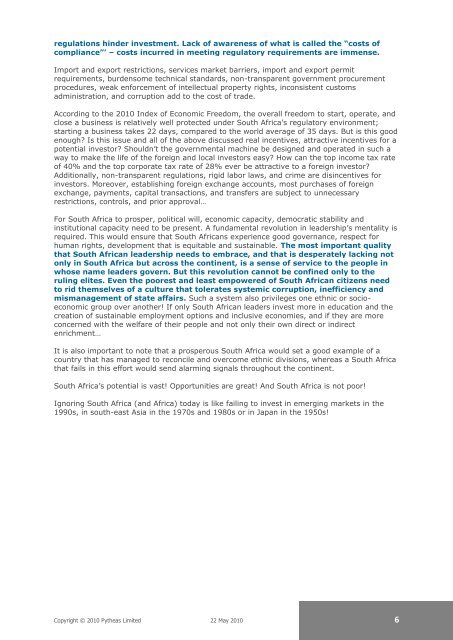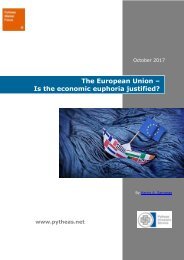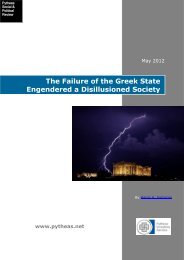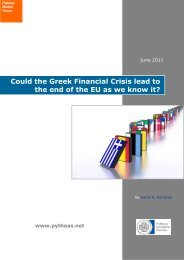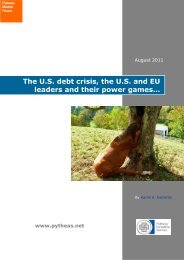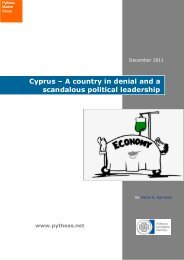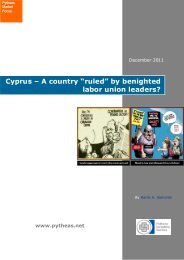South Africa, it is time to turn potential into achievement!
Can this African nation that won the admiration of the world for its peaceful transition to democracy after generations of white supremacy rule conquer the bitter divisions of its past to turn itself into the biggest mover and shaker of the African continent? Or will it become even more admired in foul governance, racial tension, poverty, corruption, violence and decay to turn into yet “another” African state? South Africa is a land of contrasts! It has immense mineral wealth, with 90% of the world’s known platinum reserves, 80% of its manganese, 70% of its chrome and 40% of its gold, as well as rich coal deposits; yet 43% of its population live on less than €3 a day. It has sky-high unemployment yet at the same time suffers from crippling, basic skills shortages. It was the first country to perform a heart transplant, yet its people’s health record is among the world’s worst. And, leaving aside war zones, it is one of the most violent and crime-ridden countries on the planet. Ignoring South Africa (and Africa) today is like failing to invest in emerging markets in the 1990s, in south-east Asia in the 1970s and 1980s or in Japan in the 1950s!
Can this African nation that won the admiration of the world for its peaceful transition to democracy after generations of white supremacy rule conquer the bitter divisions of its past to turn itself into the biggest mover and shaker of the African continent? Or will it become even more admired in foul governance, racial tension, poverty, corruption, violence and decay to turn into yet “another” African state?
South Africa is a land of contrasts! It has immense mineral wealth, with 90% of the world’s known platinum reserves, 80% of its manganese, 70% of its chrome and 40% of its gold, as well as rich coal deposits; yet 43% of its population live on less than €3 a day. It has sky-high unemployment yet at the same time suffers from crippling, basic skills shortages. It was the first country to perform a heart transplant, yet its people’s health record is among the world’s worst. And, leaving aside war zones, it is one of the most violent and crime-ridden countries on the planet.
Ignoring South Africa (and Africa) today is like failing to invest in emerging markets in the 1990s, in south-east Asia in the 1970s and 1980s or in Japan in the 1950s!
You also want an ePaper? Increase the reach of your titles
YUMPU automatically turns print PDFs into web optimized ePapers that Google loves.
egulations hinder investment. Lack of awareness of what <strong>is</strong> called the ―costs of<br />
compliance‖’ – costs incurred in meeting regula<strong>to</strong>ry requirements are immense.<br />
Import and export restrictions, services market barriers, import and export perm<strong>it</strong><br />
requirements, burdensome technical standards, non-transparent government procurement<br />
procedures, weak enforcement of intellectual property rights, incons<strong>is</strong>tent cus<strong>to</strong>ms<br />
admin<strong>is</strong>tration, and corruption add <strong>to</strong> the cost of trade.<br />
According <strong>to</strong> the 2010 Index of Economic Freedom, the overall freedom <strong>to</strong> start, operate, and<br />
close a business <strong>is</strong> relatively well protected under <strong>South</strong> <strong>Africa</strong>’s regula<strong>to</strong>ry environment;<br />
starting a business takes 22 days, compared <strong>to</strong> the world average of 35 days. But <strong>is</strong> th<strong>is</strong> good<br />
enough? Is th<strong>is</strong> <strong>is</strong>sue and all of the above d<strong>is</strong>cussed real incentives, attractive incentives for a<br />
<strong>potential</strong> inves<strong>to</strong>r? Shouldn’t the governmental machine be designed and operated in such a<br />
way <strong>to</strong> make the life of the foreign and local inves<strong>to</strong>rs easy? How can the <strong>to</strong>p income tax rate<br />
of 40% and the <strong>to</strong>p corporate tax rate of 28% ever be attractive <strong>to</strong> a foreign inves<strong>to</strong>r?<br />
Add<strong>it</strong>ionally, non-transparent regulations, rigid labor laws, and crime are d<strong>is</strong>incentives for<br />
inves<strong>to</strong>rs. Moreover, establ<strong>is</strong>hing foreign exchange accounts, most purchases of foreign<br />
exchange, payments, cap<strong>it</strong>al transactions, and transfers are subject <strong>to</strong> unnecessary<br />
restrictions, controls, and prior approval…<br />
For <strong>South</strong> <strong>Africa</strong> <strong>to</strong> prosper, pol<strong>it</strong>ical will, economic capac<strong>it</strong>y, democratic stabil<strong>it</strong>y and<br />
inst<strong>it</strong>utional capac<strong>it</strong>y need <strong>to</strong> be present. A fundamental revolution in leadership’s mental<strong>it</strong>y <strong>is</strong><br />
required. Th<strong>is</strong> would ensure that <strong>South</strong> <strong>Africa</strong>ns experience good governance, respect for<br />
human rights, development that <strong>is</strong> equ<strong>it</strong>able and sustainable. The most important qual<strong>it</strong>y<br />
that <strong>South</strong> <strong>Africa</strong>n leadership needs <strong>to</strong> embrace, and that <strong>is</strong> desperately lacking not<br />
only in <strong>South</strong> <strong>Africa</strong> but across the continent, <strong>is</strong> a sense of service <strong>to</strong> the people in<br />
whose name leaders govern. But th<strong>is</strong> revolution cannot be confined only <strong>to</strong> the<br />
ruling el<strong>it</strong>es. Even the poorest and least empowered of <strong>South</strong> <strong>Africa</strong>n c<strong>it</strong>izens need<br />
<strong>to</strong> rid themselves of a culture that <strong>to</strong>lerates systemic corruption, inefficiency and<br />
m<strong>is</strong>management of state affairs. Such a system also privileges one ethnic or socioeconomic<br />
group over another! If only <strong>South</strong> <strong>Africa</strong>n leaders invest more in education and the<br />
creation of sustainable employment options and inclusive economies, and if they are more<br />
concerned w<strong>it</strong>h the welfare of their people and not only their own direct or indirect<br />
enrichment…<br />
It <strong>is</strong> also important <strong>to</strong> note that a prosperous <strong>South</strong> <strong>Africa</strong> would set a good example of a<br />
country that has managed <strong>to</strong> reconcile and overcome ethnic div<strong>is</strong>ions, whereas a <strong>South</strong> <strong>Africa</strong><br />
that fails in th<strong>is</strong> effort would send alarming signals throughout the continent.<br />
<strong>South</strong> <strong>Africa</strong>’s <strong>potential</strong> <strong>is</strong> vast! Opportun<strong>it</strong>ies are great! And <strong>South</strong> <strong>Africa</strong> <strong>is</strong> not poor!<br />
Ignoring <strong>South</strong> <strong>Africa</strong> (and <strong>Africa</strong>) <strong>to</strong>day <strong>is</strong> like failing <strong>to</strong> invest in emerging markets in the<br />
1990s, in south-east Asia in the 1970s and 1980s or in Japan in the 1950s!<br />
Copyright © 2010 Pytheas Lim<strong>it</strong>ed 22 May 2010 6


